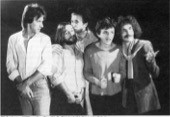3.
The 1960s: Electrification and Subculture come to Yugoslavia
Before rock became a question and the ’60s generation was making demands or giving cause to the establishment for worry, Tito weighed in on another imported cultural craze: jazz.
Author Radina Vučetić quoted Tito as saying, “I have nothing against modern dance and jazz. And that is necessary. Young people have to enjoy themselves. However, it’s not necessary that jazz be the exclusive foundation of their development. It is necessary to develop classical music, which is much greater, and, in general, music that isn’t profane.”
He was asked to do so again during the 8th congress of the League of Communists in 1964. The “youth question” was front and center on the congress agenda, because of the belief that ideological “deformations” would negatively affect the youth. Tito, however, recognized in the youth’s changing tastes evidence of a desire for internationalism that was expected in communism, and he declared the youth of the day socialist and worthy of an audience with the establishment.
By 1968 the country was embroiled in a series of general strikes that included university students and faculty. Again, during this time Tito approved of the student actions on the one hand, saying that they were proof of the correctness of the Yugoslav style of self-management socialism. However, on the other hand he punished student and faculty leaders involved in the strikes without actually giving in to any of the students’ democratic demands. These demands included the democratization of public media, the prevention of the conversion of public property to private or joint stock property, the prevention of the amassing of wealth through real estate speculation, and a reform of the educational system to ensure the education and material well-being of students of all sectors of Yugoslav society.
Such directly political attempts on the part of the Yugoslav youth at this time to influence the operation of the state and its institutions were met with suspicion, retaliation, and incarceration by the entrenched bureaucratic cadres and those enriching themselves through the accumulation of private property and the manipulation of finance and privatized industry.
This only exacerbated the problem of fresh voices participating in and influencing institutional public politics, a problem that first arose in the 1950s with Yugoslavia’s break with Stalin’s Comintern. Yugoslavia was pressed to shore up its survival while the possibility of retaliation from the USSR for breaking with the Soviet Union remained, and it reverted to a wider dependence on market mechanisms in order to do so. In 1955 wage planning at the federal level ceased, and in 1958 the policy of income sharing was introduced. This led to the worker collectives of Yugoslavia’s unique self-management socialist system competing against one another, resulting in regionalism and unequal distribution of resources to underprivileged geographic regions while opening the way to eventual overt nationalism between groups and populations in the Socialist Federal Republics of Yugoslavia’s six constituent republics. During this time the Federal Investment Fund was also dismantled, and those funds earmarked for federal redistribution to the rebuild and industrialize impoverished areas after the end of the war were instead funneled into banks. The economy began to grow on debt and remitted pay from Yugoslavs working as guest-workers (Gastarbeiter) abroad. Resources were no longer distributed by the government according to need, while regionalism and nationalism were fueled due to their short-term lucrativeness under the new circumstances.
Youth were disillusioned and retreated from direct political participation following their disappointment in 1968. Instead, they became more focused on popular culture and art which, in comparison with more formal visual art and literature, was not yet fully policed by the newly rich political elites for a competing share of ideological space in the country.
Bijelo Dugme

Bijelo Dugme (Janjatović, 32)
The most well-known and successful act of 1970s Yugoslavia was Sarajevo band Bijelo dugme (White Button). They combined Balkan folk melodies with sometimes direct copying of popular prog-rock elements from Western European and American bands, and they represented an unadulterated local acceptance and adaptation of the rock genre to the Balkan setting. Founder and guitarist Goran Bregovic would go on to score films, such as for director Emir Kusturica and make Balkan folk instrumentation famous around the world.
Bijelo dugme’s debut album was recorded in 20 days and released at the end of November 1974 with one of the most famous and provocative album covers in rock history. It included re-recordings of popular earlier singles and a song, Sweetheart Don’t Sleep While the Music Still Plays that was accused of having more than a passing resemblance to Chuck Berry’s Rock ‘n Roll Music. The record reached gold, selling over 40,000 copies by the following February and outselling the previous high-selling record by the Yugoslav band YU-Group. It cemented their popularity in Yugoslavia. Bregović brought rural Bosnian melodies and folk song traditions to blues and prog rock, as evidenced by the opening rack of the first record. Themes of romantic pining and innuendo, in which objects take on double meanings, are mainstays of such folk music forms as sevdalinka, popular in Bosnia. These folk music forms, influenced by Turkish musical tradition, are in evidence in the opening, eponymous track by the group:
mala bi se zakopčala u me
kad bi bio dugme plavo
ne bi znala da sam kraj nje spavo
Ref.
Hej mala hej
kad bi bio dugme, hej
Da sam djerdan sav od zlata
grlio bih malu oko vrata
diro bih je cijelog dana
ne zna selo, ne zna njena nana
Ref.
My sweetheart would be buckled to me
If I were a blue button
She wouldn’t know that I sleep beside her
Hey sweetheart, hey
If I were a button, hey
If I were a golden necklace
I’d embrace my baby around her neck
I’d touch her all day long
The village doesn’t know, her mother doesn’t know
Bregović’s guitar virtuosity and the band’s ability to not only mimic the prog-blues rock styles popularized by a British band such as Deep Purple, but also advance the style by incorporating national elements to lend “Western” rock a Yugoslav character, was in itself a statement on the Balkan youths’ desire and ability to participate in world trends on their own terms and as equals. The “Bosnian” folk element is foregrounded by the decision to preface the 6-minute organ and guitar jam leading up to the vocal performance with atmospheric and pastoral sounds of goats and sheep braying and birds singing.
The tongue-in-cheek change of style with their virtual plagiarism of a Chuck Berry tune with replacement lyrics in Bosnian demonstrated a range that went beyond simple mimicry and a characteristic sense of play and confidence.
muzika dok svira
jer taj ludi ritam
nikom ne da mira
Mama je legla i odavno spava Mama
niko nece znati da si bila s' nama
cekat' cu te jos
trenutak mala moja
onda odoh plesat' sam
Budi se, svi te zovu
muzika se cuje
zaigrajmo skupa
cijelo drustvo tu je
Tata spava, svuda je tama
niko nece znati da si bila s' nama
cekat' cu te jos
trenutak duso moja
onda odoh plesat' sam
Ref.
Jer to je mala moja rock'n'roll
mala to je rock
The music is still playing
Because that crazy rhythm
won’t calm anyone
went to bed and has been asleep for awhile
No one will know that you were with us
I’ll wait for you another
minute my baby
Then I’m gone to dance alone
Wake up, everyone’s calling you
music is heard
Let’s dance together
Everyone’s here
Dad’s asleep, it’s dark all over
No one is gonna know that you were with us
I’ll wait for you another
minute, my soul
then I’m off to dance alone
Because that, my love, is rock ‘n roll
rock'n'roll, rock'n'roll


